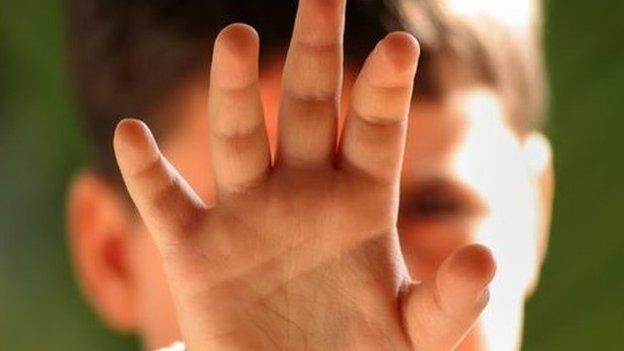Historical abuse inquiry: Police examine 'possible homicide'
- Published
The man says he was first abused by his own father before being "handed over" as a young boy to the group
Police are investigating "possible homicide" linked to what has been described as a paedophile ring involving powerful people in the 1970s and 1980s.
The group is alleged to have included senior figures in public life, the military, politics and law enforcement.
In a statement Scotland Yard said inquiries were at an early stage.
A key witness who has spoken to police has told the BBC that he was abused for nine years as a boy.
He has appealed for others who may have evidence to come forward.
The Metropolitan Police said detectives were made aware of allegations regarding possible homicide during the last month.
The Met's statement said officers from its child abuse investigation command were working closely with colleagues from the homicide and major crime command.
"At this early stage in this inquiry, with much work still to do, it is not appropriate to issue appeals or reveal more information," the force said.
"We will not be giving a commentary as this inquiry develops, and it is important that officers are allowed to pursue their work without interference.
"We will not comment upon speculation as to the identity of any person or locations that may or may not feature in this inquiry."
'Very powerful people'
Speaking anonymously to the BBC but using the name "Nick", the alleged victim said he had given three days of video-taped evidence to detectives.
His accounts are being assessed as part of Operation Midland, a new Scotland Yard investigation which is under the umbrella of its inquiry into historical abuse, Operation Fairbank.
Nick, now in his 40s, says that he was first abused by his own father before being "handed over" as a young boy to the group.
"They were very powerful people and they controlled my life for the next nine years," Nick added.
"They created fear that penetrated every part of me, day in day out. You didn't question what they wanted, you did as they asked without question and the punishments were very severe."
Nick said the group was "very organised" and would arrange for chauffeur-driven cars to pick up boys, sometimes from school, and drive them to "parties" or "sessions" at locations including hotels and private apartments in London and other cities.
The children were not usually allowed to speak with each other and Nick says he struggled to work out the identities of the abusers. He has given the names of some of those he believes were involved to the police and the BBC.
'No fear'
The BBC has agreed not to reveal any of these names because of the ongoing police investigation and because of the need for further evidence to corroborate his account.
"They had no hesitation in doing what they wanted to do," Nick said. "Some of them were quite open about who they were. They had no fear at all of being caught, it didn't cross their mind."
When a child "stepped out of line", he said that abusers would inflict brutal and painful punishments.
He said: "[The abuse] destroyed my ability to trust. It's pretty much wrecked any relationships I have had. Intimacy for me is a pretty much a no-go area."
Nick said he had one motivation for speaking to the BBC - to encourage other alleged victims or those who unwittingly assisted the abusers to come forward.
"They need to find the strength that we as survivors have done," he said. "People who drove us around could come forward. Staff in some of the locations could come forward. There are so many people who must have had suspicions.
"We weren't smuggled in under a blanket through the back door. It was done openly and people must have questioned that and they need to come forward."
Nick says his torment suddenly came to an end when he went to a pre-arranged place to be picked up by a driver and no-one arrived.
He went the next day, worried that he would be punished for a diary mistake. Again there was no car waiting. He never saw his abusers again and says he still has no idea why.
- Published1 December 2015
